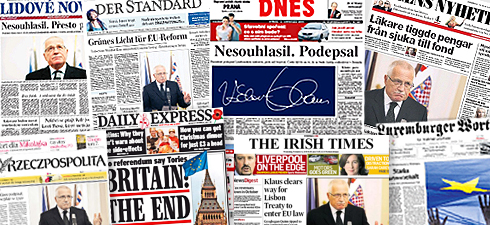At last, after a prolonged campaign of obstruction, and without ceremony or press conference, Czech President Václav Klaus finally signed the Lisbon Treaty on 3rd November, just three hours after the Czech Constitutional Court had dismissed a final appeal against the text. "He didn't agree, but he signed," reads the Mladá Fronta DNES headline over the photograph of the signature, which was long awaited by political leaders across Europe.
Unable to let the occasion pass without a few words of fighting talk, Klaus announced that the treaty heralded "the end of the Czech Republic as a sovereign state" — a comment which did not escape the attention of the Prague daily's Martin Komárek, who was quick to point out that "the pen is wiser than the mouth." The columnist also argues that all of the EU's member states gave up "part of their sovereignty when they joined the Union, which also enables their representatives to defend their countries' interests."
Brussels has good reason "to celebrate" notes De Volkskrant. But from now on, the Dutch daily insists "politicians should be forced to make a solemn pledge to avoid tinkering with European institutions," which has made "navel gazing the principal pastime in Brussels." What De Volkskrantwants to see "is a Europe… that can show its citizens that it is leading the way to progress."
The great leap forward?
"The new rules established by Lisbon constitute a great leap forward for Europe," avers Jacek Pawlicki in Gazeta Wyborcza. However, the commentator also warns that "treaties, however perfect, can never be more than words on a page if no one has the will to implement them. Huge amounts of determination and energy were required to make Lisbon a success. Let's hope that this effort will not be wasted."
But after eight years of negotiations and referendums, the Lisbon Treaty is no guarantee of the best of all possible worlds in Brussels. "The Union was not particularly sexy before Lisbon, and it will take more than a document to restore its youthful energy — in fact, it may simply make things worse," insists Martin Komárek in Mladá Fronta DNES. The problem of the image of the EU is also taken up by the Irish Times, which notes that "the debate on an unwieldy, largely unreadable treaty, albeit democratising and essential to streamlining the workings of the institutions, did little to dispel perceptions of the EU as an elite project." The trauma of the Lisbon campaign "may be behind us, but its legacy in the continuing alienation of citizens will remain a key challenge for all Europe’s leaders."
Europe in the throes of "civilisational suicide"
At least one newspaper is not swept away on a tide of optimism. For Rzeczpospolita, fine institutions are scant reward for "the cultural suicide," which is taking place in Europe. While Klaus was signing the treaty, the European Court of Human Rights condemned Italy for the crucifixes hanging in its school classrooms. In cutting off Europe from its Christian roots, the judiciary in Strasbourg "has overturned the values that founded the European community," avers the conservative Polish daily. "Our countries are no longer linked by St. Mary's Basilica in Kraków, Notre Dame Cathedral, or the Sistine Chapel, but by the Lisbon Treaty, MTV, our full bellies, holidays in Ibiza and tolerance for gays."
"The European political elite has shown its usual disdain for the popular will," complains The Times' leader. "But now that the Treaty of Lisbon has been ratified it is time to change the subject. "In politics, continues the London daily, "when the facts change you have to change your strategy...This is exactly what David Cameron has now signalled he will do," in setting aside the idea of a referendum on the treaty if he is elected to form a new government next spring.
But the battle is not over yet. Noting that the British Conservatives are still hoping to take advantage of the accession treaty for Croatia to introduce exemptions for the UK, the Irish Times voices its concern: "even before the ink is dry on Lisbon, the promise that its enactment should put an end to constitutional/institutional wrangling in the EU for a generation appears wishful thinking. Not a happy prospect."
Was this article useful? If so we are delighted!
It is freely available because we believe that the right to free and independent information is essential for democracy. But this right is not guaranteed forever, and independence comes at a cost. We need your support in order to continue publishing independent, multilingual news for all Europeans.
Discover our subscription offers and their exclusive benefits and become a member of our community now!












